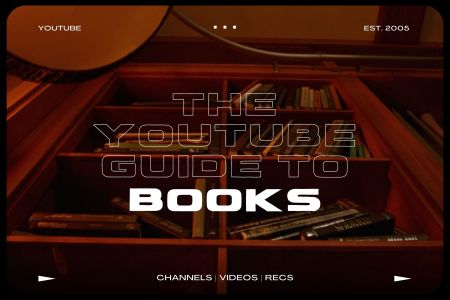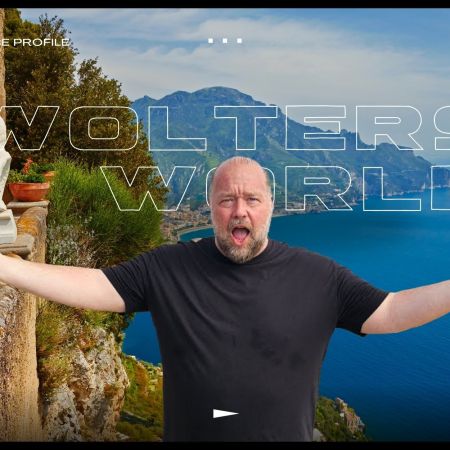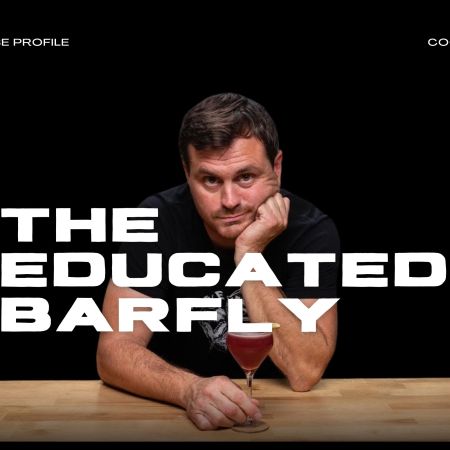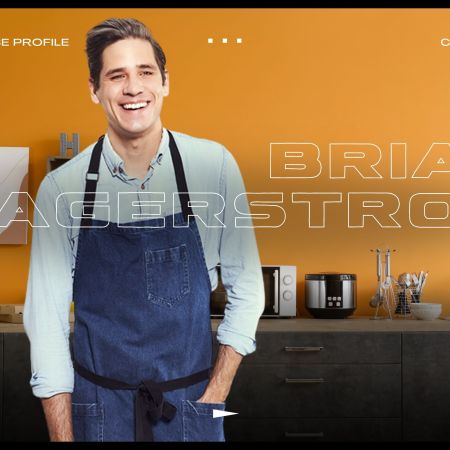Happy (early) birthday, YouTube. To celebrate the site’s 20th anniversary, we present: The InsideHook Guide to YouTube, a series of creator profiles, channel recommendations and deep dives about the viral, controversial, unstoppable video-sharing giant.
Jack Edwards is a sensation in the book world. When I logged onto our Google Meet call, he was in Sweden attending the Gothenburg Book Festival. Before that, he was in London. Before that, New York. He was last year’s Booker Prize livestream host — at only 25 years old. He’s working on a podcast, writing his debut novel and doing it all while managing a massive social media following.
With over a million YouTube subscribers, 660,000 TikTok followers and 540,000 on Instagram, Edwards has risen to the top of social media’s book ecosystem, which is called, depending on what platform you’re on, BookTube, BookTok and Bookstagram. If you don’t frequent this corner of the internet, you should know that these are no ordinary online subcultures — they’re all causing real-world waves in the world of publishing. These internet communities have helped launch the careers of popular fiction writers like Colleen Hoover (It Ends With Us) and Sarah J. Maas (A Court of Thorns and Roses). In 2021, BookTok helped sell over 20 million printed books, and by 2022, sales went up another 50%.
The top creators in this space have made best-sellers out of otherwise middling books in a way that’s forever changed marketing in the publishing industry: Book publishers are now courting the young influencers running these channels, flipping the script on the traditional gatekeepers in literature.
“I love the BookTube and BookTok space because it feels like a meritocracy,” says Edwards, noting that it’s the personal tastes of creators and subscribers driving the momentum. He just happens to be one of the leading channels of this movement. If he reviews a book, he’s doing it in front of a community numbered in the millions.
Edwards’s book-fueled stardom has been a long time coming. Born in Brighton, he studied English literature at Durham University and wanted to work in a book-adjacent career, eventually applying to publishing jobs, but that’s not how he started his social media career.
“I started by posting videos about university that were trying to promote access to higher education and demystify the university experience because no one in my family had been to university before,” he says of his main YouTube channel (these days he has two). “I never posted on the books I was reading because I thought, ‘That’s too personal. Why would anyone care why I’m reading?’”
The YouTube Guide to Books
Every channel worth watching on “BookTube,” the best literary corner of the internet, whether you prefer classic literature or modern fantasyHis transition to book content began during the pandemic, amid a society-wide search for community. Edwards was still in college. He loved the online book world and wanted to be a part of it, but it seemed easier said than done: How could he contribute something meaningful and different than the other YouTubers who had been posting for years?
“A lot of the content that was being made was not necessarily evergreen,” he says. “It was like, ‘What I Want to Read in May,’ ‘What I Want to Read in June,’ but by July, those videos are outdated.”
Thus came his first video. Edwards was living alone at the time. He had just moved into a new house and had no wifi, just plenty of books and an SD card. So he took on his first challenge: Read 30 books during 30 days of lockdown. He accomplished this feat, but the video never got posted — his SD card snapped in half at the end, and he lost all his footage.
In one of his first successful videos, Edwards bought and read a collection of decorative books on Etsy — the kinds you’d see in a hotel lobby or bar and wonder if there’s actually anything written in them.
“I remember filming it and editing it and I was about to upload it, and I’m thinking, this is so stupid. No one is gonna watch this video. This is so niche,” he says. After it was uploaded, his subscriber count quickly doubled, and it became his first video to hit one million views. “That was bonkers to me because I couldn’t fathom that that many people would be interested in content about books.”
There could be a really niche book that someone happens to pick up…and then creates a piece of content, and that can go viral. It doesn’t have to be who can afford this billboard or who got the biggest book deal.
– Jack Edwards
It turns out, going niche has been a successful model for Edwards. These days, he says sometimes the more niche he goes, the better. “It’s hard to invent something that doesn’t exist, but it’s fun to challenge yourself to be creative with it. And in my experience, it pays off.”
Edwards has a strong sense dreaming up these seemingly eccentric ideas and packaging them in an entertaining way, like only reading romance books for a week or trying the “dark academia aesthetic.” These types of videos succeed partially by treating literature as part of one’s lifestyle. For Edwards, it becomes more than just stories to read, and he portrays this on camera effortlessly: It’s art to admire, lessons to learn about the human condition, or new worlds to run away to and explore.
He’s also quite funny and has a knack for being ahead of the trend curve: He read the books that Harry Styles, Timothée Chalamet and Kendall Jenner have recommended. He read every book that Connell and Marianne — the main characters of Sally Rooney’s novel Normal People — study and discuss throughout the novel. He read a book that famously never uses the letter “E.” He even rated every book Lisa Simpson reads in The Simpsons based on very specific criteria; he says it’s one of his favorites he’s ever made.
Where does he get his ideas from? Oddly, he finds inspiration from another social media niche: makeup influencers.
“Fundamentally, they have one theme and that is, ‘I make videos about makeup,’ but then in some videos they’re doing a celebrity’s makeup or trying a certain challenge or doing a full face of makeup using only products from the drugstore,” he says. “I was really inspired by the ways that they would take their concept of beauty content and then be really creative with it.”
It’s not all celebrities and pop culture, though. Edwards isn’t afraid to wade into more serious topics. He’s recommended Palestinian literature and banned books. He posted a video critiquing the recently published New York Times story on the “100 Best Books of the 21st Century” (which he was asked to contribute to). Right now, he’s working on a series where he reads a book from every country, recently focusing on Asia, which has inspired a range of discussions in Edwards’s community of subscribers about reading global literature. That’s something that happens often in the comments of his videos. He essentially runs an online book club.
For his part, Edwards is constantly reading, usually some mix of classic and contemporary work across a wide range of genres.
“I try not to always only read books that I could make videos out of, but sometimes it’s the other way around,” he says. “I read a bunch of books, and I’m like, ‘Oh, how can I make a video about these?’”
At the time we talked, Intermezzo by Sally Rooney was next on his list.
Edwards has seen the evolution of the book space on YouTube in three different phases. The first was straightforward: videos about what creators were reading that month. Those types of lists are still popular, but it’s in the next phase that BookTube really came to life and found its virality: videos that tied literature to other trends in pop culture, like the ones Edwards makes.
In its latest iteration, BookTube is moving toward longer-form video essays, a contrast to the 15-second clips featured on TikTok and Instagram (and YouTube, with the growth of Shorts). It’s also a time when the creators behind these channels are being taken much more seriously by the industry.
“BookTubers are interviewing authors, BookTubers are being involved in conversations within book marketing,” Edwards says, “so now we’re at the table.”
Does that mean book influencers like him, once outside the mainstream, are now simply another cog in the publishing industry? Not quite. What Edwards loves about BookTube is the community it fosters, the diversity and range of creators, and the fact that, even as people try to game social media, the books that truly resonate with readers can still go viral even if they have little to no marketing budget.
“There could be a really niche book that someone happens to pick up and really connects with, and finds the themes fascinating, and then creates a piece of content about it, and that can go viral,” he says. “It doesn’t have to be who can afford this billboard or who got the biggest book deal.”
Every literary success story starts with just a few readers, and they don’t even need to be internet famous ones. It’s a good reminder of the power — on a personal and commercial level — of sharing books we love with others.
“[Reading] is something that we do on our own,” Edwards says. “Often we get into bed before we go to sleep and read a few pages of a book, or we do it when we’re on public transport. It’s so nice to be able to take something that we do by ourselves and create a community out of it.”
This article was featured in the InsideHook newsletter. Sign up now.

























